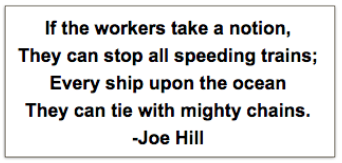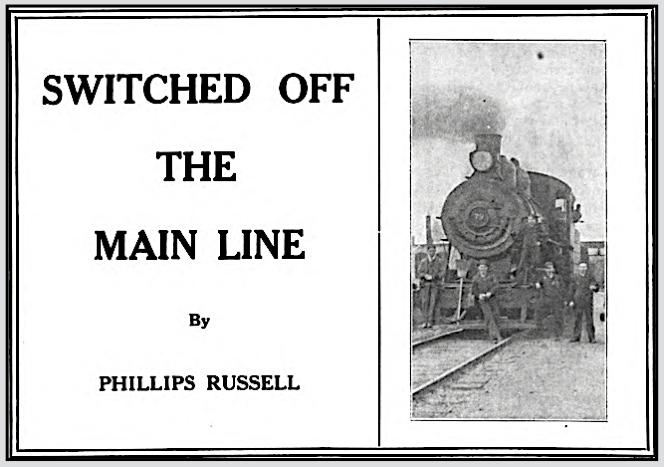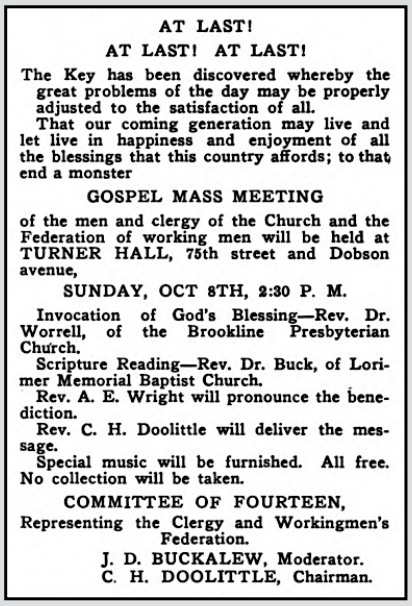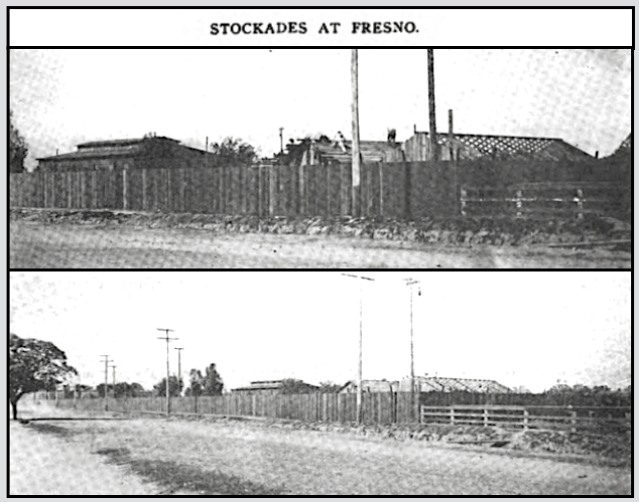 —————
—————
Hellraisers Journal – Friday November 3, 1911
“Switched off the Main Line” by Phillips Russell
From the International Socialist Review of November 1911:
ON the last of September, the long delayed strike of the System Federation among the shopmen of the Harriman lines took place, extending from the middle west to the Gulf in the south and taking in all that territory westward to the Pacific ocean.
The System Federation comprises the shopmen of ten different organizations. the principal ones being the International Association of Machinists, Brotherhood of Railway Carmen, Brotherhood of Boilermakers, Brotherhood of Blacksmiths and Helpers, International Association of Sheet Metal Workers, the steamfitters, clerks, painters, engine hostlers and members of the Federal Labor Union. The first five mentioned are the leading organizations involved. The international presidents of these unions, having had many conferences with Vice-President Kruttschnitt of the Harriman lines, finally called the strike on three lines, these lines being the Illinois Central, the Southern Pacific and the Union Pacific lines.
The union officials claimed that 25,000 men came out. The railroad heads asserted there were only a few thousand at most.
In this strike there are just two questions with which the men in the ranks need concern themselves, and these are-hours and wages. The matter of recognition early in the fight was made the most of, but of all the issues involved, this was the most insignificant. However, the Federation heads insisted on making recognition the leading demand and pushing the first two fundamentals into the background.
Of all the questions at issue, that pertaining to the hours of labor is supreme. Men on strike can afford to make the matter of wages a secondary issue. It is the hours that count, for it cannot be too often repeated that shorter hours in variably mean higher wages.
Several thousand unorganized workers followed the union men out, and having been given the impression that the revolt was for an eight hour day and better conditions, they were eager for the fight.
But on learning that the question of hours and conditions was not going to figure in the struggle, and on hearing the incessant chant of the Federation heads that they asked only recognition for the Federation, the unorganized men soon lost interest and began to drift back into the shops.
Many of these men were foreigners and not residents of this country long enough to become “eligible” for union member ship. The result was that they went back to work, bitter against those who had misled them and disgusted with the tactics that forced an enthusiastic striker into becoming resentful enough to be come a scab.
Among the most eager and determined strikers were those of the Burnside shop of the Illinois Central, which is just outside Chicago. Crowded shop meetings were held nearly every day. Finally an organization of preachers affiliated with the Chicago Federation of Labor, saw a chance to get into the affair.
Militant workers who in times past have allowed brethren of the cloth to butt into strikes have in most cases had reason to regret it. A strike is a battle in the continuous war between capital and labor. Preachers and priests have no place in the midst of it. The time for prayer is before or after. Headed by the Rev. C. H. Doolittle, a working machinist, and J. D. Buckalew, District President of the International Association of Machinists, these gentry worked up a mass meeting of Illinois Central strikers by means of pink circulars whose wording was as follows :
The meeting was pulled off on Sunday afternoon in Grand Crossing, Turner Hall, Chicago. About 19 religious leaders took part. It was a sort of combined revival and prayer meeting, the speakers holding forth like old-time “exhorters.”
The principal result of this exhibition was the stirring up of religious prejudice and over 100 Catholic strikers were so offended that they went back to work the next day.
[Stockades.]
The strike was mismanaged from the beginning. In the first place it was delayed so long that the railroads had ample time to secure scabs in the eastern cities and hurry them west. Huge stockades were erected at several cities in California and these bull-pens were packed full of strike-breakers.
[Union Scabs.]
In Los Angeles, union men helped to complete the Stockade, which was built expressly to house scabs! The construction was done mostly by non-union carpenters, but the wiring for lights, etc., was done by members of the Brotherhood of Electrical Workers.
Most cruel of all is the fact that the railroad brotherhoods obediently hauled carloads of scabs to various points and delivered them where they were to break the strike of their own brothers in the shops. Railroad men thus furnished scabs for the company while ostensibly lending their “moral support” to the strikers.
Almost the only encouraging feature of the strike was the news from California that many Mexican and Chinese laborers, though despised and unorganized, were prompt to strike with their American brethren. In comparison with this notable exhibition of class consciousness the action of the railroad “brotherhoods” in staying at work is too contemptible for words.
[Emphasis added.]
~~~~~~~~~~~~~~~~~~~~
SOURCES & IMAGES
Quote Joe Hill, General Strike, Workers Awaken, LRSB Oct 1919
https://play.google.com/books/reader?id=vTlRAAAAYAAJ&printsec=frontcover&pg=GBS.PA6
The International Socialist Review, Volume 12
(Chicago, Illinois)
July 1911-June 1912
-edited by Charles H. Kerr
https://archive.org/details/InternationalSocialistReview1900Vol12/mode/1up
-ISR of Nov 1911, pages 268-270
https://www.marxists.org/history/usa/pubs/isr/v12n05-nov-1911-ISR-gog-Corn.pdf
See also:
Tag: Illinois Central and Harriman Lines Strike of 1911 to 1915
https://weneverforget.org/tag/illinois-central-and-harriman-lines-strike-of-1911-to-1915/
The Lizard’s Trail:
A Story from the Illinois Central and Harriman Lines Strike
of 1911 to 1915 Inclusive
-by Carl E. Person
Lake Publishing Company, 1918
https://books.google.com/books?id=9lE3AAAAMAAJ
Tag: Phillips Russell
https://weneverforget.org/tag/phillips-russell/
“We Called Each Other Comrade”
Charles H. Kerr & Company, Radical Publishers
-by Allen Ruff
U of IL Press, 1997
(search: “phillips russell”)
https://books.google.com/books?id=8wWshAPMI6MC
~~~~~~~~~~~~~~~~~~~~~~~~~~~~~~~~~~~~~~~~
Casey Jones the Union Scab – Mark Ross
Lyrics by Joe Hill




